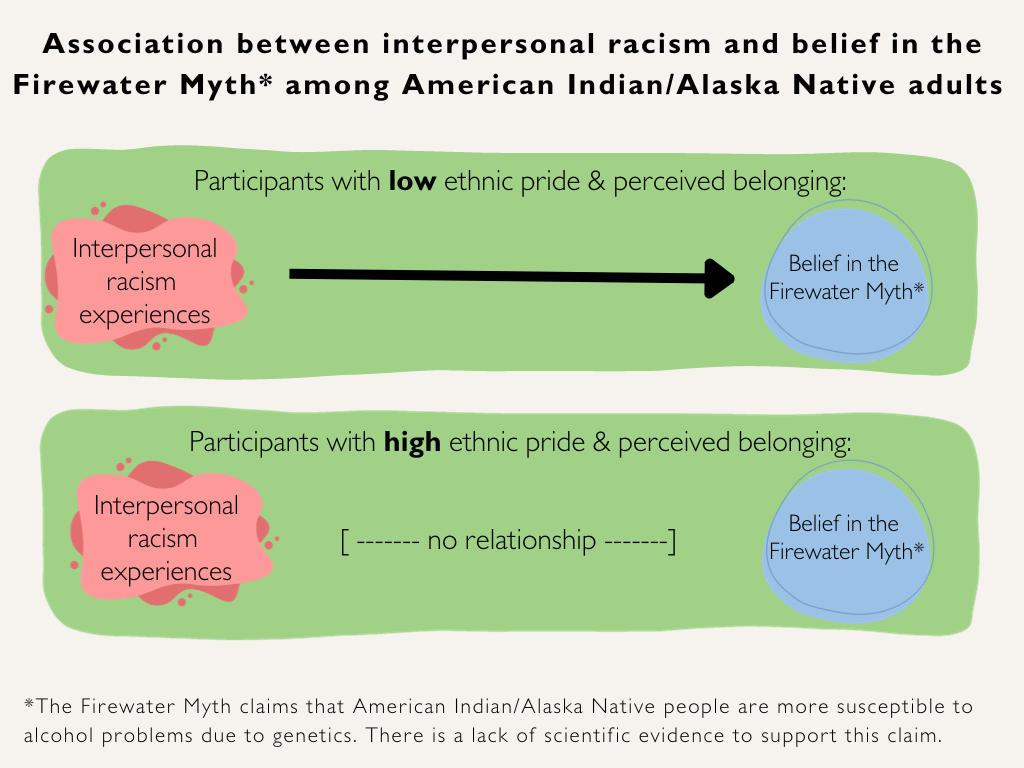Editor’s Note: Today’s review is part of our month-long Special Series on Addiction Myths and Misinformation. Throughout November, The BASIS is showcasing the dangers of myths and misinformation related to addiction.
The Firewater Myth claims that American Indian/Alaska Native (AI/AN) people are more susceptible to alcohol problems due to genetics. Despite a lack of evidence to support this claim, many AI/AN college students believe that they have a biological vulnerability to alcohol problems, a belief that is associated with relatively heavy drinking and alcohol-related consequences. This week, as part of our Special Series on Addiction Myths and Misinformation, The DRAM reviews a study by Vivian M. Gonzalez and Monica C. Skewes that examined whether perceived racism and substance use treatment history are associated with belief in the Firewater Myth among AI/AN adults.
What was the research question?
Among AI/AN adults, are perceived racism and substance use treatment history associated with belief in the Firewater Myth?
What did the researchers do?
As part of a larger community-based participatory research project, the researchers recruited 198 AI/AN adults from a rural Northern Plains reservation community who self-identified as trying to recover from a substance use problem. Participants completed a survey that measured Firewater Myth beliefs, experiences of racism, ethnic pride and perceived belonging, and previous substance use treatment. The researchers distinguished between experiences of interpersonal racism (i.e., interactions between people that diminish and harm members of racially marginalized groups) and systemic racism (i.e., processes and outcomes of racial inequality and inequity in life opportunities and treatment). The researchers then conducted regression analyses to examine relationships among the survey measures.
What did they find?
Ethnic pride and perceived belonging moderated the association between interpersonal racism and Firewater Myth beliefs. Specifically, experiencing interpersonal racism was associated with stronger belief in the Firewater Myth, but only for participants with low ethnic pride and perceived belonging. For participants with relatively high ethnic pride and perceived belonging, interpersonal racism experiences were unrelated to belief in the Firewater Myth (see Figure).
On the other hand, ethnic pride/perceived belongingness did not moderate the relationship between systemic racism and belief in the Firewater Myth. Regardless of their ethnic pride/perceived belongingness, participants who felt they had experienced systemic racism reported greater belief in the Firewater Myth. The researchers found no association between previous substance use treatment and Firewater Myth beliefs.

Figure. Association between interpersonal racism experiences and belief in the Firewater Myth among AI/AN adults. Ethnic pride and perceived belonging moderated this association. Click image to enlarge.
Why do these findings matter?
AI/AN adults who have experienced greater racism appear more likely to believe in the Firewater Myth, but stronger ethnic pride and perceived belonging may be a protective factor in the relationship between interpersonal racism and Firewater Myth beliefs. Debunking the Firewater Myth, fighting against racism, and cultivating positive ethnic pride and perceived belonging are especially important among this population. There is a need for more health education programs designed with and for Tribal communities. One such program is xaʔtu̓s (First Face) for Mental Health, a mental health and wellness training run by the Center for Indigenous Research, Collaboration, Learning, and Excellence (CIRCLE).
Every study has limitations. What are the limitations in this study?
The researchers restricted the sample to AI/AN adults from a single reservation who self-identified as having a substance use problem. Thus, the results may not be generalizable to AI/AN adults who do not live on the reservation, are from other reservations or regions of the country, or do not have a substance use problem. The researchers also used a cross-sectional study design, so we cannot conclude any causality between experiences of racism and belief in the Firewater Myth.
For more information:
xaʔtu̓s (First Face) for Mental Health has a library of videos and research, as well as a resource list that includes Native focused resources. The National Institute on Alcohol Abuse and Alcoholism has tips and resources for people struggling with problem drinking. For additional drinking self-help tools, please visit our Addiction Resources page.
— Caitlyn Matykiewicz, MPH
What do you think? Please use the comment link below to provide feedback on this article.




